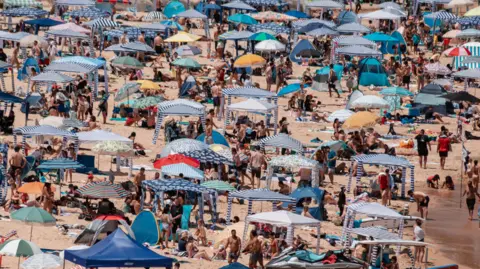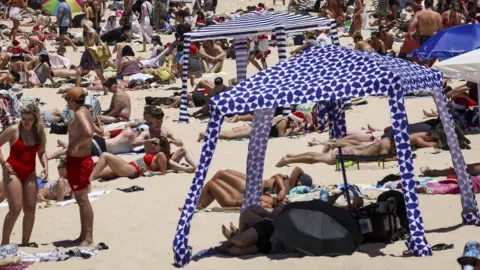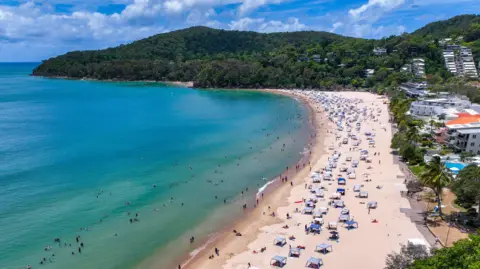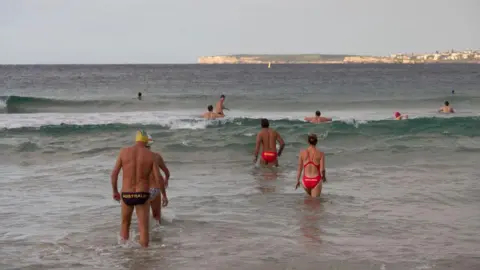Cool Cabanas: How beach tent sparked turf war in Australia

 Tamara Toon Photography
Tamara Toon PhotographyFor years, a controversial invader has been gradually taking over Australia’s beloved beaches.
Swallowing up the sand, blocking ocean views and turning the shore into an irksome maze, is a sea of large beach tents, called cabanas in Australia.
“It’s chockers [crowded]. They’re all over the place,” Sydneysider Claire, 30, told the BBC.
For her – and most Australians – cooling off on a sweltering day means a solid drive to the coast, plus an eternity trying to find a parking space. Now, the cabana craze means there’s another battle waiting for them on the beach.
Polyester covers flap in the breeze as far as the eye can see. Some are empty, set up at the crack of dawn and then abandoned for hours on end, until the owners actually want to use them.
“The sheer amount of space that people are taking up… [when] you’re just trying to find a free square inch of sand to lay your towel, it can just be a little bit frustrating,” Claire says.
She’s not alone in her irritation. Several summers of simmering tension has, in the first days of 2025, exploded into a full-on turf war, sparking debate about Australian culture and beach etiquette.
A row over the acceptable use of cabanas has dominated social media, spawned a wave of opinion pieces and television segments, and even dragged in the prime minister.
Self-described haters say entitled cabana crews are hogging public space and disrespecting other beachgoers.
“When you’re… polluting the beach with your four cabanas next to each other, where is Guncle [Gay Uncle] Nic going to go,” anti-cabana crusader and TikToker Nic Salerno said on TV talk show The Project.
“I just want my space on the beach, guys.”
 Getty Images
Getty ImagesBut the pro-cabana mob say seeking protection from Australia’s vicious sun isn’t a crime – and it’s every man for himself.
Australia is the skin cancer capital of the world, and many supporters – including national charity, the Cancer Council – argue the new trend should actually be celebrated.
“My partner and I have a cool cabana because we both burn extremely easily and we don’t want to die of skin cancer by 30, hope this helps,” one person wrote, responding to a TikTok rant.
No one is discounting the importance of sun safety, the cabana critics counter, but they say that’s just a convenient excuse for many of the people using the beach tents.
Half the time they’re not even sitting under the shade covers, they claim, and there’s no need for two people to whip out an entire tent for an hour or two, when sun cream and a hat will do just fine.
 Jordys Drone Photography
Jordys Drone PhotographyOther cabana devotees are more forward about their motivations. Breakfast television presenter Davina Smith admitted that for her, it is about nabbing “the prime piece of real estate” on busy beaches.
She is one of the people who pitch their cabana castles in the early morning to reserve territory for her family later that day.
“There’s a lot of research that goes into this. You get up early, you’ve got to watch the tides. You can’t just plonk it there and walk away… you invest in it,” Smith argued on Nine’s Today programme.
Prime Minister Anthony Albanese was among the hordes irked by the trend: “That’s not on,” he told the same show.
“One of the great things about Australia, unlike some parts of the world, you go and you got to pay to go to the beach. Here, everyone owns the beach… And that’s a breach of that principle, really.”
Even lifeguards have opinions on the matter, with some telling local media the cabana camps can make it hard for them to do their jobs.
Why is this so divisive?
There are a number of cultural quirks which mean Cabanagate has Australians more worked up than a magpie in spring.
Firstly, the country loves to think of itself as an egalitarian society – the land of a “fair go” – and that extends to the use of one of its most precious national assets.
“Australian beaches, they always have been seen as shared spaces, democratic spaces where social hierarchies dissolve…. [they’re] seen as a great equaliser,” says Ece Kaya, a researcher at the University of Technology Sydney.
 Getty Images
Getty ImagesAnd Australians are “fiercely” protective of that ideal: “They see it as a birthright,” says Chris Pepin-Neff, who studies Australian beach culture.
They point to the backlash in 1929 when beachgoers at Sydney’s Coogee Beach were forced to pay for access to the only part of the water covered by shark nets. More recently, a bid to rent out part of Sydney’s famous Bondi Beach to an exclusive beach club was met with a huge outcry.
And while the use of sprawling cabanas is a relatively new phenomenon, there’s long been “enormous class tension” around the use of the country’s coastline, Dr Pepin-Neff adds.
A lack of infrastructure, affordable housing and community attitudes tend to lock ordinary Australians out of waterfront areas, while those natural assets are often monopolised by those lucky enough to live there.
“And there’s a perception that it’s encroaching even further, [so] that an average family can’t even get a spot at the beach.”
But they say there’s no real data on who is using cabanas and why. They also argue there’s many good reasons people might use them. Maybe they’ve travelled a long way so they plan to stay at the beach longer, or they may have a disability or young children they need to cater for, he says.
“There is a balance between a free and open beach that everybody can use, and making sure that you’re respectful.”
 Getty Images
Getty ImagesThey offer no defence for the “land bankers” though: “As a Sydneysider, I think that is abusing the privilege… that is not a fair go.”
As the debate intensifies though, there are some calls for a truce to restore the peace to Australian shores.
Beachkit Australia founder Rowan Clark, who sells equipment including cabanas, told the Sydney Morning Herald newspaper even he thinks cabana lovers should be more courteous.
“They should only allow set up at the rear of the beach in a line,” he said. “Once this is exhausted, then no more of this style of shade should be allowed.”
Others want authorities to rein it in, like some have in the United States. There are suggestions councils could limit how many cabanas can be set up on their beaches, and where.
But Sydney resident Claire, for all her wrath, worries that this could tip the scales in the other direction and exclude other people from using the beach.
“You don’t want to get too precious about it, obviously… it’s just the beach, first world problems right?
“I think in general, we should just try to be considerate of one another.”
World News || Latest News || U.S. News
Source link




